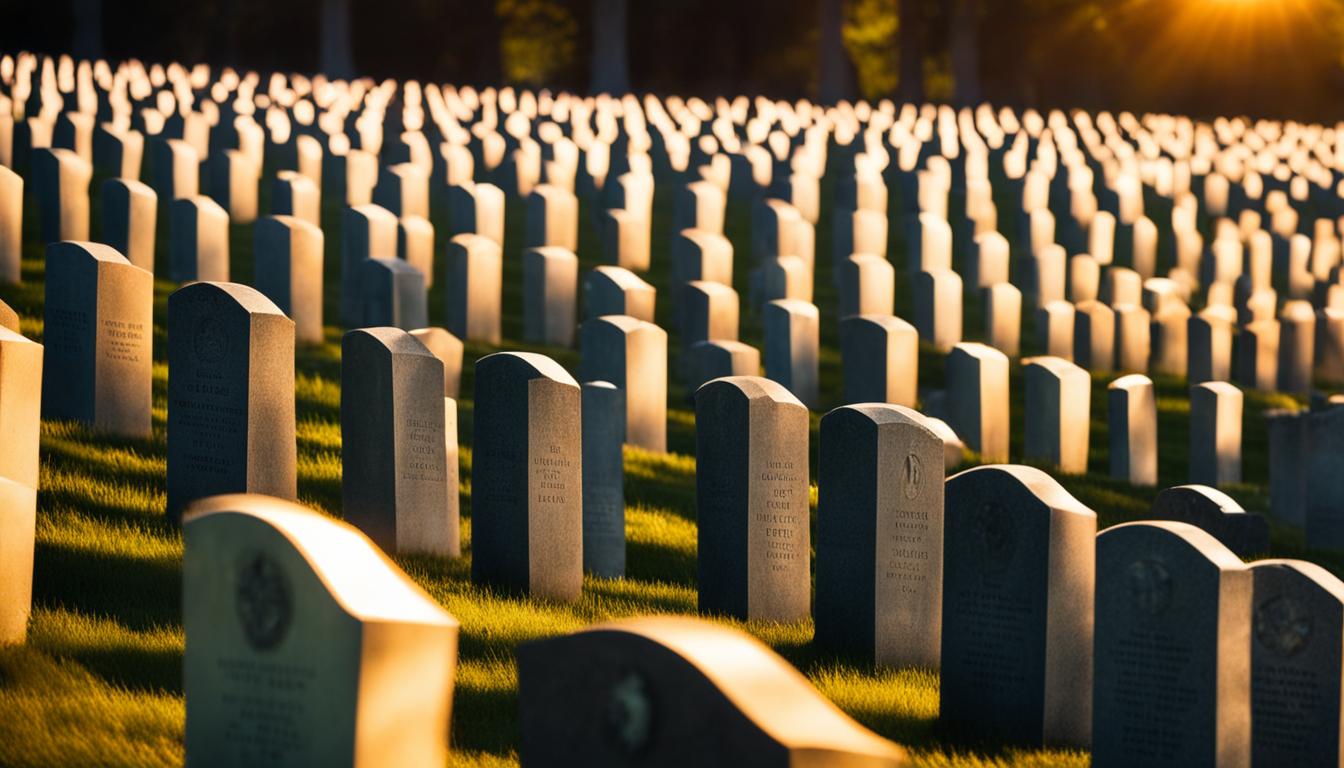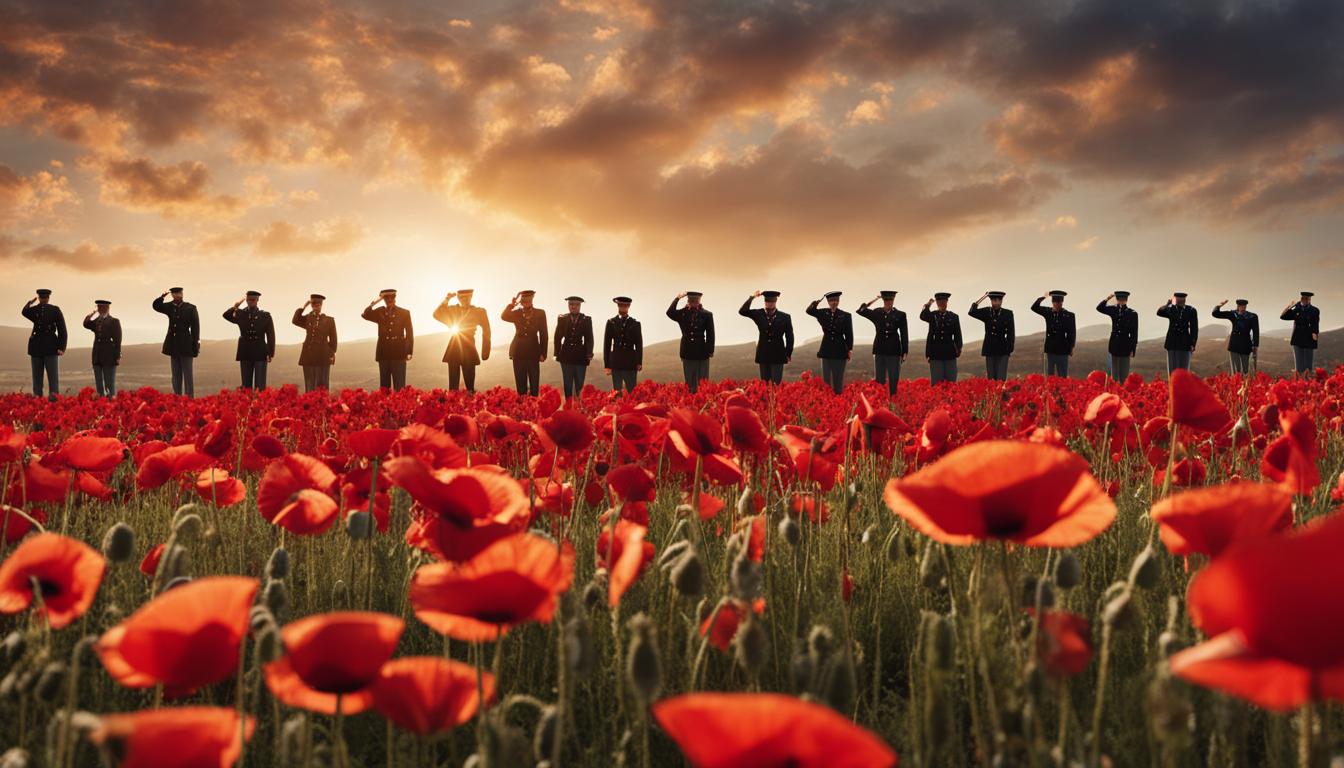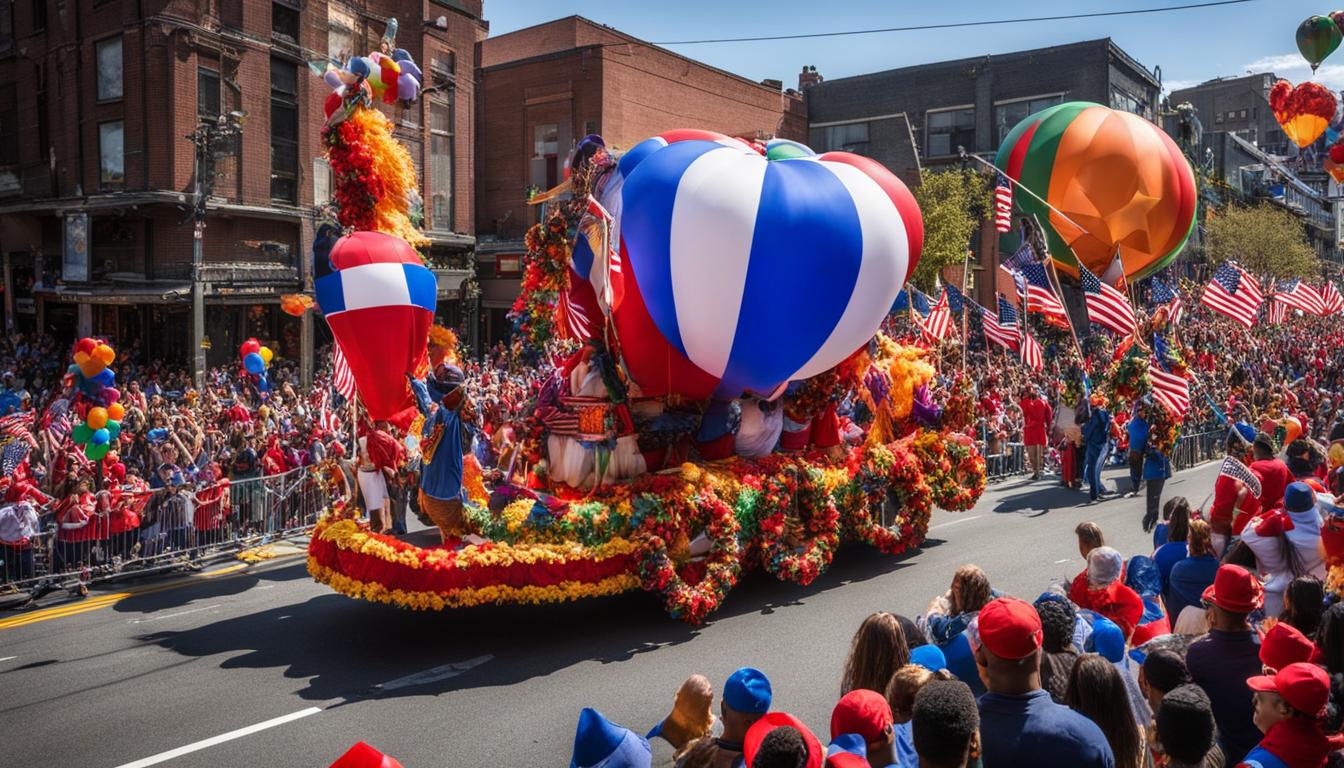The United States is a country that celebrates a rich variety of national holidays throughout the year. These holidays hold cultural, historical, and patriotic significance, reflecting the values and traditions cherished by Americans. From New Year’s Day to Christmas, each holiday brings its own unique traditions and observances. In this comprehensive guide, we will explore the US national holidays, learn about their origins, and understand their importance in American society.
Key Takeaways:
- National holidays play a crucial role in shaping the collective identity of the United States.
- Each holiday holds cultural, historical, and patriotic significance, reflecting the values cherished by Americans.
- US national holidays range from New Year’s Day to Christmas, with each holiday bringing its own traditions and observances.
- Understanding and celebrating these holidays allow individuals to connect with the nation’s heritage and honor its values.
- It is important to teach and learn about American historical holidays to gain a deeper understanding of pivotal moments and key figures in US history.
New Year’s Day – January 1st
New Year’s Day in the United States falls on January 1st each year. This day marks the beginning of a new year, and many Americans celebrate it on New Year’s Eve, the night before. It is a time for reflection, setting goals, and making New Year’s resolutions.
For many, New Year’s Day is a time to gather with loved ones, watch parades and football games, and enjoy special meals. It is a day filled with hope and anticipation for what the new year will bring. Some people also participate in polar bear plunges, where they take a dip in freezing cold waters as a symbolic way to start the year fresh and invigorated.
The celebration of New Year’s Day varies across the country, with different regions having their own unique traditions. For example, in New York City, people gather in Times Square to watch the famous ball drop at midnight. In Pasadena, California, the Rose Parade is held, featuring elaborate floats made of flowers. Regardless of the specific customs, New Year’s Day is a time of joy, reflection, and new beginnings.
| Significance of New Year’s Day | Traditions and Customs |
|---|---|
| Start of a new year | Watching the ball drop in Times Square |
| Reflection and goal-setting | Participating in polar bear plunges |
| Celebration with loved ones | Enjoying special meals |
| Variety of regional traditions | Attending the Rose Parade in Pasadena |
“Cheers to a new year and another chance for us to get it right.” – Oprah Winfrey
Birthday of Martin Luther King, Jr. – Third Monday in January
The third Monday in January is designated as the birthday of Martin Luther King, Jr., a prominent leader of the Civil Rights Movement in the United States. MLK Day, as it is commonly known, is a time to honor his contributions to the fight for racial equality and reflect on the progress made towards achieving a more just and inclusive society.
“I have a dream that my four little children will one day live in a nation where they will not be judged by the color of their skin, but by the content of their character.” – Martin Luther King, Jr.
On MLK Day, many communities organize events and activities that celebrate King’s legacy and promote racial harmony. These may include speeches, panel discussions, poetry readings, music performances, and volunteer projects aimed at making a positive impact on society. The day is also an opportunity for individuals to educate themselves about the Civil Rights Movement and the ongoing struggle for equality.
The Significance of MLK Day
MLK Day is more than just a day off work or school. It serves as a reminder of the importance of standing up against injustice and working towards a more equitable society. By honoring Martin Luther King, Jr., on this day, we acknowledge the progress made in the fight for civil rights and recognize that the work is not yet complete.
MLK Day is a time to reflect on the power of peaceful protest, the enduring legacy of King’s message, and the ongoing efforts to dismantle systems of oppression. It is a call to action, encouraging individuals to educate themselves, engage in conversations about race and equality, and contribute to the creation of a just and inclusive America.

| Date | Day | Year |
|---|---|---|
| January 15 | Monday | 1929 |
| January 17 | Monday | 2022 |
| January 16 | Monday | 2023 |
| January 15 | Monday | 2024 |
| January 20 | Monday | 2025 |
Washington’s Birthday – Third Monday in February
Washington’s Birthday, also known as Presidents Day, is observed on the third Monday in February. This holiday is a tribute to the first president of the United States, George Washington, who played a crucial role in the Revolutionary War and the founding of the country.
Originally, Washington’s Birthday was solely dedicated to honoring George Washington’s birth on February 22nd. However, in 1971, the Uniform Monday Holiday Act was passed, which shifted the celebration of Washington’s Birthday to the third Monday in February to create more three-day weekends.
Today, Presidents Day is not only a day to remember George Washington and his contributions, but it has also become a day to honor all past presidents of the United States. It is an opportunity to reflect on the leadership, accomplishments, and challenges faced by American presidents throughout history.
Presidents Day Table:
| President | Term | Political Party |
|---|---|---|
| George Washington | 1789-1797 | Independent |
| Thomas Jefferson | 1801-1809 | Democratic-Republican |
| Abraham Lincoln | 1861-1865 | Republican |
| Theodore Roosevelt | 1901-1909 | Republican |
| Franklin D. Roosevelt | 1933-1945 | Democratic |
Presidents Day is an opportunity for Americans to reflect on the impact that presidents have had on shaping the nation. It is also a time for civic engagement, historical education, and appreciation of the democratic principles that the United States holds dear.
Memorial Day – Honoring Fallen Soldiers and Military Remembrance
Memorial Day, observed on the last Monday in May, is a solemn day of remembrance and a time to honor the brave men and women who have made the ultimate sacrifice while serving in the United States Armed Forces. This national holiday holds deep significance for Americans, as it provides an opportunity to reflect on the valor and selflessness of those who have fought for our freedom.
Since its establishment to commemorate those who lost their lives in the Civil War, Memorial Day has expanded to honor all veterans who have died in service to their country. It is a day when communities across the nation hold memorial services, visit cemeteries, and place flags and flowers on the graves of fallen soldiers. The National Moment of Remembrance, observed at 3:00 p.m., encourages a moment of reflection and unity as Americans pause to honor the memory of those who have made the ultimate sacrifice.
“Memorial Day is not just about honoring veterans; it’s honoring those who lost their lives. Veterans had the fortune of coming home. For us, that’s a reminder of when we come home we still have a responsibility to serve. It’s a continuation of service that honors our country and those who fell defending it.” – Pete Hegseth
Honoring Veterans – A Time of Gratitude and Reflection
Memorial Day also serves as an occasion to express gratitude to living veterans for their service and sacrifice. Many communities organize parades, concerts, and other commemorative events to honor and thank those who have served in the military. These activities provide opportunities for people to come together and show their support, ensuring that the memory of fallen soldiers lives on.
As Memorial Day approaches, it is important to remember that honoring our veterans and fallen heroes is not limited to a single day. We can actively support and advocate for the well-being of veterans throughout the year by participating in volunteer activities, donating to organizations that assist veterans, and staying informed about the issues they face. By doing so, we can continue to pay tribute to their service and ensure that their sacrifices are never forgotten.

| Date | Year | Memorial Day |
|---|---|---|
| Monday, May 31 | 2021 | Memorial Day |
| Monday, May 30 | 2022 | Memorial Day |
| Monday, May 29 | 2023 | Memorial Day |
| Monday, May 27 | 2024 | Memorial Day |
Independence Day – July 4th
Independence Day, also known as the 4th of July, is celebrated on July 4th each year in the United States. This holiday holds great significance as it commemorates the signing of the Declaration of Independence in 1776, which declared the United States as an independent nation. It is a day filled with American patriotism, where people come together to honor the principles of freedom, liberty, and equality that the nation was built upon.
American patriotism is on full display during Independence Day celebrations. Communities across the country host parades, concerts, and fireworks displays to mark the occasion. Families and friends gather for barbecues, picnics, and outdoor activities, enjoying the summer weather and the company of loved ones. The day is often characterized by red, white, and blue decorations, symbolizing the colors of the American flag.
Table: Independence Day Celebrations by State
| State | City | Fireworks Display | Parade |
|---|---|---|---|
| Texas | Houston | Yes | Yes |
| California | Los Angeles | Yes | No |
| New York | New York City | Yes | Yes |
| Florida | Miami | Yes | No |
The celebrations vary across different states and cities, with some hosting grand fireworks displays and parades, while others focus on community events and local traditions. Independence Day provides an opportunity for Americans to come together and reflect on the significance of their freedom and the principles of democracy that the nation cherishes.
Labor Day – First Monday in September
Labor Day is observed on the first Monday in September. It is a day to honor the achievements of working people in the United States. This holiday has been celebrated since 1886 and is often considered the unofficial end of summer, marked by picnics, barbecues, and relaxation.
Started as a way to recognize the contributions and struggles of the labor movement, Labor Day has evolved into a day of rest and recreation for many Americans. It serves as a reminder of the importance of fair working conditions, labor rights, and the value of hard work. It also provides an opportunity for families and friends to come together and enjoy one last summer celebration before the start of the fall season.
“Labor Day is a time to celebrate the contributions of all working people and the achievements of the labor movement. It is a day to reflect on the progress made in securing workers’ rights and to recognize the ongoing fight for fair wages, safe working conditions, and equal opportunities.”
– Labor Union Representative
As the summer comes to a close, Labor Day offers a chance for individuals to recharge and relax before returning to their daily routines. Whether it’s spending time outdoors, enjoying a leisurely picnic, or simply taking a well-deserved break, Labor Day allows working people to unwind and enjoy the fruits of their labor.
| Key Features of Labor Day | Date | Significance |
|---|---|---|
| National Holiday | First Monday in September | Celebration of working people and their achievements |
| Unofficial end of summer | Marking the transition from summer to fall | Opportunity for relaxation and recreation |
| Recognition of labor rights | Reflecting on the progress made in securing fair working conditions | Honoring the ongoing fight for workers’ rights |

Why Does Labor Day Matter?
Labor Day holds great significance as it acknowledges the invaluable contributions and sacrifices made by the American workforce. It serves as a reminder of the importance of fair labor practices, safe working conditions, and the pursuit of workers’ rights. Labor Day also provides an opportunity for individuals to appreciate their own hard work and to recognize the efforts of others.
Furthermore, Labor Day acts as a symbol of national unity, highlighting the shared values of dedication, perseverance, and the pursuit of a better future. It serves as a time for communities to come together, celebrate their collective achievements, and reflect on the progress made in creating a more equitable and inclusive society.
As the last hurrah of summer, Labor Day gives individuals a chance to relax, recharge, and spend quality time with loved ones. It emphasizes the importance of work-life balance and serves as a reminder to prioritize self-care and leisure.
New Perspectives on Columbus Day
Every second Monday in October, the United States observes Columbus Day. This holiday has traditionally commemorated Christopher Columbus’ arrival in the Americas in 1492. However, in recent years, there has been a growing movement to recognize this day as Indigenous People’s Day instead. This shift aims to acknowledge and honor the Native American communities that inhabited the continent long before Columbus’ arrival.
The controversy surrounding Columbus Day stems from the complex history of European colonization and its impact on indigenous populations. Many argue that celebrating Columbus perpetuates a Eurocentric narrative and overlooks the hardships faced by Native Americans. The recontextualization of this holiday as Indigenous People’s Day promotes a more inclusive perspective, encouraging education about the diverse cultures and histories of the indigenous peoples.
The Impact of Christopher Columbus
Christopher Columbus played a significant role in European exploration and the subsequent colonization of the Americas. His voyages opened up new trade routes and paved the way for further European expansion. However, the consequences of this exploration were devastating for indigenous populations. The arrival of Europeans brought disease, violence, and forced displacement, leading to the decimation of native communities. Recognizing Indigenous People’s Day serves as a reminder of these historical injustices and encourages a more nuanced understanding of America’s complex past.
It is essential to approach Columbus Day, or Indigenous People’s Day, with an open mind and a willingness to learn. By acknowledging the contributions, cultures, and struggles of Native Americans, we can foster a more inclusive and accurate representation of American history. Let us continue to reflect on the legacy of Christopher Columbus while honoring and celebrating the rich diversity of indigenous cultures in the United States.
| Columbus Day | Indigenous People’s Day |
|---|---|
| Traditionally celebrated as the arrival of Christopher Columbus | Recognizes and honors the indigenous peoples who inhabited the Americas before European colonization |
| Controversial due to the negative impact of colonization on Native American communities | Seeks to reframe the narrative and promote awareness of the rich history and contributions of indigenous cultures |
| Emphasizes European exploration and colonization | Highlights the resilience and diversity of indigenous peoples |
Veterans Day – November 11th
On November 11th each year, the United States celebrates Veterans Day to honor the brave men and women who have served in the military. Originally known as Armistice Day, this holiday was established to commemorate the end of World War I. It was renamed Veterans Day in 1954 to honor all veterans, past and present.
Veterans Day holds great significance as it provides an opportunity to express gratitude and pay tribute to those who have selflessly defended our nation. It is a day to reflect on the sacrifices made by servicemen and women and to recognize their contributions to preserving freedom and democracy.
Parades, ceremonies, and memorial services are held across the country to honor veterans. Communities come together to show their support and appreciation, and individuals often take the time to personally thank veterans for their service. It is a day of remembrance, unity, and gratitude for the brave individuals who have dedicated themselves to safeguarding our nation.

| Important Dates | Events and Activities |
|---|---|
| November 11th |
|
| Throughout November |
|
| Ongoing |
|
Thanksgiving – Fourth Thursday in November
Thanksgiving is an important national holiday in the United States, celebrated on the fourth Thursday in November. It is a time for family gatherings, a traditional meal, and giving thanks for the blessings of the year. Thanksgiving has its roots in a harvest celebration held by the Pilgrims in Massachusetts in 1621.
During the first Thanksgiving, the Pilgrims and Native Americans came together to share a feast and express gratitude for a successful harvest. Today, Thanksgiving is a cherished holiday that brings families and loved ones together to enjoy a special meal, which typically includes roasted turkey, stuffing, cranberry sauce, mashed potatoes, and pumpkin pie.
“Thanksgiving offers us an opportunity to reflect on the abundance in our lives and appreciate the blessings we have received. It is a time to gather with loved ones, express gratitude, and create lasting memories.”
– Unknown
Alongside the traditional meal, Thanksgiving is also a time for parades, football games, and volunteering in the community. The Macy’s Thanksgiving Day Parade in New York City is a popular annual event, featuring giant balloons, floats, and performances. Many people also take the opportunity to give back to their community by volunteering at food banks or serving meals to those in need.
Overall, Thanksgiving is a cherished holiday that combines the values of gratitude, family, and tradition. It serves as a reminder to appreciate the blessings in our lives and to come together with loved ones to celebrate and create lasting memories.
Christmas – December 25th
Christmas, celebrated on December 25th, is a significant Christian holiday in the United States. It marks the birth of Jesus Christ and is a time for religious observances, gift-giving, and spending time with loved ones. Many Americans decorate their homes and exchange presents during this festive season.
The origins of Christmas can be traced back to ancient pagan celebrations of the winter solstice. In the 4th century, December 25th was designated as the official date to celebrate the birth of Jesus Christ by the Roman Catholic Church. Over the years, Christmas has evolved into a holiday filled with traditions, both religious and secular.
One of the most significant customs associated with Christmas is attending church services, particularly the midnight Mass on Christmas Eve. This service commemorates the birth of Jesus and serves as a time for worship and reflection. Additionally, many families choose to set up nativity scenes in their homes, depicting the scene of Jesus’ birth.
Gift-giving is another cherished tradition during the Christmas season. Families and friends exchange presents as a way to show love and appreciation for one another. The act of giving gifts is often seen as a reflection of the gifts brought by the three wise men to the baby Jesus. In recent years, there has been a growing emphasis on giving back to the community and engaging in acts of charity during the Christmas season.

Teaching American historical holidays not only enhances students’ understanding of the past but also encourages them to draw connections to the present. By examining the struggles, achievements, and sacrifices of those who came before, students gain a greater appreciation for the values and principles that underpin the United States. They develop a sense of civic responsibility and become active participants in shaping the future of their nation.
Sample Lesson Plan – Memorial Day: Honoring Fallen Heroes
Objective: To understand the significance of Memorial Day and honor the sacrifices made by military personnel.
- Introduction: Discuss the purpose of Memorial Day and its historical origins.
- Primary Source Analysis: Provide students with letters or diary entries from soldiers who have lost their lives in service. Have students analyze the documents and reflect on the personal experiences and sentiments expressed.
- Group Discussion: Facilitate a discussion on the importance of honoring fallen soldiers and the impact of their sacrifices on the nation.
- Art Activity: Have students create artwork or write poems to commemorate and express gratitude for fallen heroes.
- Reflection: Lead a class discussion on the ways in which the observance of Memorial Day contributes to the nation’s collective memory and identity.
| Benefits of Teaching American Historical Holidays | Resources Used |
|---|---|
| Encourages critical thinking and historical analysis | Gilder Lehrman Institute’s primary source documents |
| Fosters empathy and understanding of diverse perspectives | Gilder Lehrman Institute’s scholarly essays and videos |
| Promotes civic responsibility and active citizenship | Gilder Lehrman Institute’s lesson plans |
Why National Holidays Matter
National holidays in the United States play a vital role in shaping the country’s identity and fostering a sense of pride. These holidays provide opportunities for cultural celebrations, patriotic events, and reflection on significant historical events and figures. Let’s explore why these national holidays matter.
Cultural Celebrations
National holidays serve as occasions to celebrate the diverse cultural heritage of the United States. From the vibrant parades and fireworks displays on Independence Day to the Thanksgiving traditions of sharing meals with loved ones, these holidays bring people together, fostering a sense of unity and belonging. They highlight the unique customs and traditions that define American culture, allowing individuals to express their cultural pride and pass down traditions to future generations.
Patriotic Events
National holidays provide opportunities for Americans to express their patriotism and honor their country. From displaying the national flag on Flag Day to attending Veterans Day ceremonies to pay tribute to those who have served in the military, these holidays strengthen the bond between citizens and their nation. They remind us of the sacrifices made by past and present servicemen and women and reinforce the values of freedom, democracy, and equality that the United States holds dear.
Reflection of History
National holidays also serve as reminders of significant historical events and figures that have shaped the United States. These holidays allow individuals to reflect on the country’s past, acknowledge its achievements, and learn from its struggles. For example, Martin Luther King Jr. Day prompts conversations about civil rights and the ongoing fight for equality, while Memorial Day provides an opportunity to honor the brave men and women who have died in service to the nation. By reflecting on history during these holidays, Americans can gain a deeper understanding of their shared heritage and the progress made towards a more inclusive society.
In conclusion, national holidays in the United States hold immense importance. They allow for cultural celebrations, patriotic events, and reflection on history, all of which contribute to a stronger sense of national identity. These holidays remind us of the values and principles that define the United States and provide opportunities for individuals to come together, celebrate their heritage, and honor the past. By cherishing and commemorating these holidays, Americans can preserve their rich legacy and continue to strive for a brighter future.
Conclusion
National holidays in the United States hold a special place in the hearts of Americans, representing a blend of history, culture, and patriotism. From New Year’s Day to Christmas, each holiday brings its own significance and traditions. These holidays provide opportunities for individuals to connect with the nation’s heritage and honor its values.
Throughout the year, Americans celebrate a diverse range of national holidays that hold cultural, historical, and patriotic significance. From New Year’s Day, a time for reflection and setting goals, to Thanksgiving, a time for family gatherings and gratitude, these holidays mark important moments in American history and serve as reminders of the values cherished by the nation.
From honoring civil rights leaders like Martin Luther King, Jr. and commemorating the sacrifices of military veterans on Veterans Day, to celebrating the birth of the nation on Independence Day, these holidays allow Americans to reflect on the progress made and the challenges that lie ahead. They play a crucial role in shaping the collective identity of the United States and fostering a sense of unity and pride among its citizens.
Additionally, the recognition of other holidays, such as Flag Day and Halloween, and the celebration of various ethnic and religious holidays contribute to the rich tapestry of American culture. These holidays provide opportunities for individuals to learn about different traditions and foster a sense of inclusivity and understanding.
FAQ
What are national holidays in the United States?
National holidays in the United States are special days that hold cultural, historical, and patriotic significance. They are observed throughout the year and are celebrated by Americans nationwide.
How many national holidays are there in the United States?
There are several national holidays in the United States. The exact number may vary depending on the state and locality, but the most widely recognized and celebrated ones include New Year’s Day, Martin Luther King Jr. Day, Presidents Day, Memorial Day, Independence Day, Labor Day, Columbus Day (or Indigenous People’s Day), Veterans Day, Thanksgiving, and Christmas.
What is the significance of New Year’s Day?
New Year’s Day, observed on January 1st, marks the beginning of a new year. Many Americans celebrate it on New Year’s Eve, the night before. It is a time for reflection, setting goals, and making New Year’s resolutions.
Who is Martin Luther King, Jr. and why is his birthday celebrated?
Martin Luther King, Jr. was a prominent leader of the Civil Rights Movement in America, advocating for racial equality. His birthday is observed on the third Monday in January as a national holiday called MLK Day. It is a time to honor his contributions and reflect on the progress made towards equality.
What is the significance of Washington’s Birthday or Presidents Day?
Washington’s Birthday, also known as Presidents Day, is observed on the third Monday in February. It is a day to honor the first president of the United States, George Washington, who played a crucial role in the Revolutionary War. While the holiday originally focused on Washington, it has now become a day to remember all past presidents.
What is the purpose of Memorial Day?
Memorial Day is observed on the last Monday in May. Originally established to remember those who lost their lives in the Civil War, it has evolved into a day to honor all veterans who have died in service to the United States. It is a time for reflection, remembrance, and paying tribute to the sacrifices made by military personnel.
What is the significance of Independence Day?
Independence Day, also known as the 4th of July, is celebrated on July 4th each year. This holiday commemorates the signing of the Declaration of Independence in 1776. It is a day filled with patriotic displays, including parades, fireworks, and community gatherings.
Why is Labor Day celebrated?
Labor Day is observed on the first Monday in September. It is a day to honor the achievements of working people in the United States. This holiday has been celebrated since 1886 and is often considered the unofficial end of summer, marked by picnics, barbecues, and relaxation.
What is the significance of Columbus Day or Indigenous People’s Day?
Columbus Day, observed on the second Monday in October, initially commemorated Christopher Columbus’ arrival in the Americas. In recent years, there has been a shift towards recognizing it as Indigenous People’s Day, acknowledging the impact of European colonization on Native American communities.
What is the purpose of Veterans Day?
Veterans Day is celebrated on November 11th each year. Originally called Armistice Day, it marked the end of World War I. Today, it is a day to honor all military veterans and express gratitude for their service. Parades and ceremonies are held across the country to pay tribute to those who have served.
What is the significance of Thanksgiving?
Thanksgiving is observed on the fourth Thursday in November. It is a time for families to come together and share a traditional meal. Thanksgiving has its roots in a harvest celebration by pilgrims in Massachusetts in 1621 and serves as a reminder of gratitude and the importance of family.
Why is Christmas celebrated?
Christmas, celebrated on December 25th, is a significant Christian holiday in the United States. It marks the birth of Jesus Christ and is a time for religious observances, gift-giving, and spending time with loved ones. Many Americans decorate their homes and exchange presents during this festive season.
Which holidays are also recognized in the United States?
In addition to the national holidays, the United States also recognizes other holidays that hold special significance. Examples include Flag Day and Halloween, which are not federal holidays but are widely celebrated. Additionally, various ethnic and religious groups celebrate holidays like Easter, the High Holy Days, Ramadan, Day of Vesak, and Diwali, each with its own cultural traditions.
How can I incorporate American historical holidays into teaching?
American historical holidays present excellent opportunities for teaching and learning about pivotal moments, key figures, and conflicts in American history. The Gilder Lehrman Institute offers a wealth of resources, including primary source documents, essays, videos of scholarly talks, and lesson plans, to aid teachers in incorporating these holidays into their curriculum.
Why do national holidays matter in the United States?
National holidays in the United States hold immense importance. They provide opportunities for cultural celebrations, patriotic events, and reflection on significant historical events and figures. These holidays help shape the collective identity of the nation and serve as reminders of the values and principles cherished by Americans.




